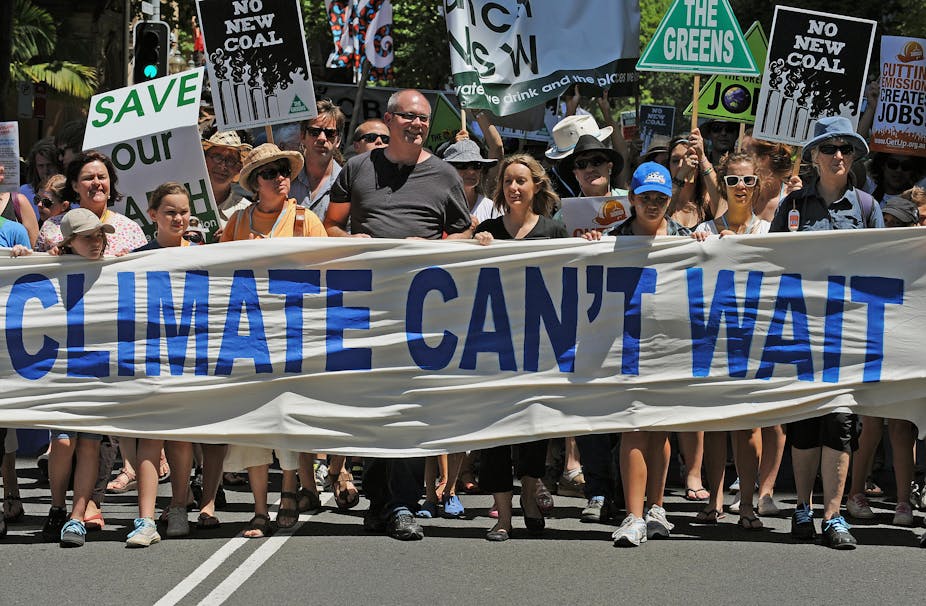The conduct of the Australian climate change debate was probably not what John Maynard Keynes had in mind when he proclaimed “words ought to be a little wild, for they are the assaults of thoughts on the unthinking”.
Such is the fear and loathing that defines the issue that the language is frequently tough. And it is increasingly supplemented by threats and intimidation directed as scientists.
Some of those who fear the perceived implications of addressing climate change seem willing to turn modernity on its head, dismissing the scientific procedure underpinning the advances in lifestyle that they enjoy.
Climate change and democracy
The dynamics of the climate change issue also has important implications for democracy. In Australia this can be seen most vividly through the lens of the proposals for a climate change citizens’ assembly and, more recently, a referendum on a carbon tax.
Given the backdrop of high emotion and political stratagem, surely any proposal that brings the Australian voter directly into the decision making process is to be lauded. Well, no. Both proposals have merit on their own terms.
But, given the history of the climate change issue and the prevailing political environment neither initiative — the referendum nor a Citizens’ Assembly — would do much to inject a dose of democracy into the issue.
Under these conditions, a referendum will not provide a clear expression of the public will on climate change.
The Australian voters’ role
The pervasive experience of the Australian citizen as that of political spectator. This means that there is little incentive to consider issues beyond making relatively superficial judgments based on intuitively appealing (and often emotionally laden) claims of those who are acting to defend strategic interests, rather than the public good.
Climate change is a complex issue. The Australian Chief Scientist may cite a working knowledge of English as prerequisite enough, but in looking at some of the more considered arguments of climate skeptics a working knowledge of the laws of thermodynamics has proved very handy.
But all is not lost. My own research demonstrates that, under the right conditions, the voter is more than capable of making a considered judgment on either climate change or a carbon tax.
Citizens ask the right questions
Randomly selected citizens involved in deliberative processes, such as citizens’ assemblies have repeatedly demonstrated a phenomenal capacity to cut through the issues. Participants ask important questions that wouldn’t have even occurred to those who attended the 2020 summit.
These processes transform citizens, who tend to feel increasingly empowered by the experience.
That the 2009 Citizens’ Parliament on political reform generally increased satisfaction with our current system of government is not surprising in this context because it directly addressed the sense of alienation with our political system.
Citizens’ Assembly
However, there were very serious problems with the citizens’ assembly on climate change, at least in the form that was proposed.
Firstly, it was perceived more as a political fix than genuine public engagement.
Secondly, while we need more citizen deliberation in order to tackle complex issues such as climate change, it cannot be done in small enclaves without finding creative ways to articulate them with wider public debate.
Failure to do so can result in the public simply ignoring the outcome, as in the case of the Deliberative Poll that preceded the referendum on the proposal for an Australian republic.
Worse, the cynicism (perceived or otherwise) behind the Citizens’ Assembly proposal has undermined what could have been a broader push to include public in a conversation about how we meet the challenge posed by climate change.
We now have an outcome where the citizen is once again relegated to the role of spectator.
A politicians’ solution
The Climate Change Commission, which was the political solution to the controversy generated by the Citizens’ Assembly proposal, recently released their report.
Disseminating the report, its underlying message has been summarized in the press along the lines of “this is bad; trust us, we’re scientists” — a message that risks playing into the hands of those who vigorously question the integrity of the science in the first place.
The real challenge for Australian politics, not just in relation to climate change, is to find ways to improve public debate: to somehow recreate the same sort of conditions that can be found in the small scale deliberative forums that not only engage the votes of citizens, but also their minds.
This is something that a Citizens’ Assembly might have contributed to if it were conducted in the early stages of an issue and combined with a follow up referendum on the issue, something that was done in British Columbia in relation to electoral reform in 2004.
Instead, the exercise was proposed in the form of a political band-aid to the loss of legitimacy; and the more recent referendum proposed to extend that loss.
However, it is precisely this sort of politics that has undermined public debate and the capacity to for our democratic system to effectively respond to the issue in the first place.

